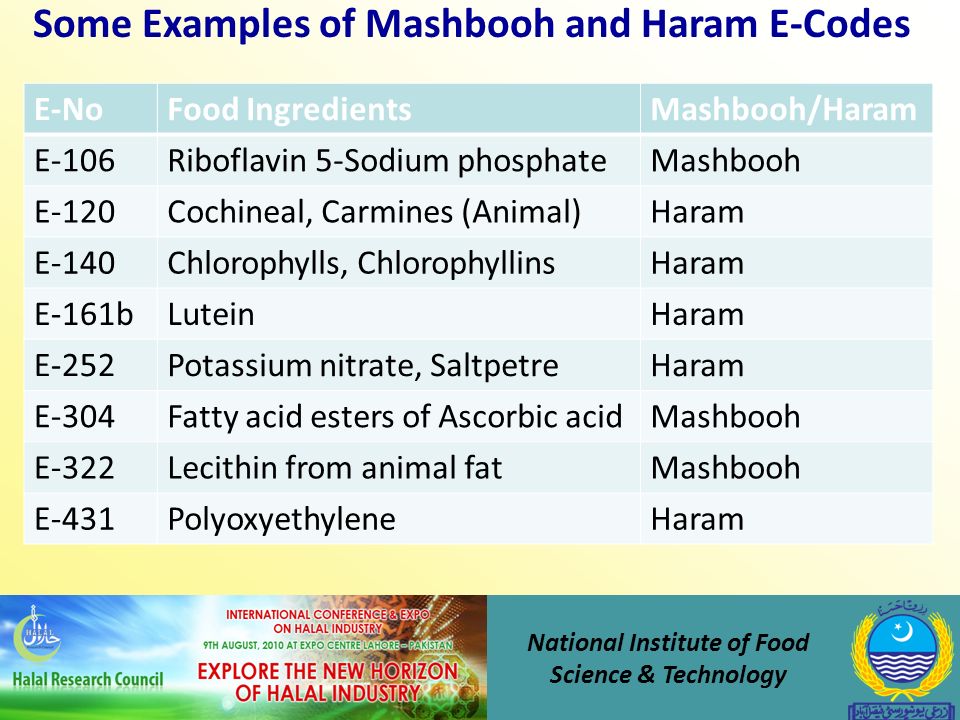
Halal Haram List Of Ingredients To Avoid

The binary concepts of halal and haram are used in a number of cultural phrases, most notably ibn (boy) al-halal and bint (girl) al-halal. These phrases are often used to refer to appropriate spouses in marriage, and stand in contrast to ibn al-haram or bint al-haram, which are used as insults. Muslims in USA face the dilemma on how to avoid Haram food products every week when they go to shop for food products in supermarkets. Food products are very complex. Among the complexities is that sometimes there are hidden ingredients, which are not declared on ingredient list. Many Muslim are not even aware of this practice.
In today’s multicultural landscape, it is becoming more important for food service managers to understand the different dietary practices followed by Americans. Population continues to grow and diversify, religious dietary restrictions, such as kosher and halal, are increasingly followed. During the last decade, the market for kosher food has increased by 15% on a yearly basis in North America.
Similarly, halal food is also experiencing strong growth. Halal consumers now spend $20 billion on food each year in the United States. Strict laws and regulations governing these two types of diets outline what foods a person can and cannot eat and how to prepare them. To help understand these religious practices, each diet will be examined in greater depth. The Kosher Diet Food is kosher when it meets dietary requirements outlined by Jewish law or kashrut, making it acceptable for people observing those laws to eat.
The role of a kosher supervisor is to ensure the food is kosher and remains kosher after preparation or processing. A kosher symbol on a food product means that the product has been certified kosher from an agency. Kosher food is divided into three groups: meat, dairy and pareve (neither meat nor dairy).
Only animals that chew their cud, have cloven hooves and are free from disease are considered kosher. These restrictions also apply to animal flesh, organs, milk and any by-products. Domesticated fowl are considered kosher.
Seafood with fins and scales are also allowed. According to Jewish law, meat and dairy products cannot be combined or eaten at the same meal. Many people wait between three to six hours after eating a meal containing meat to have dairy products. Pareve foods do not contain any meat or dairy, therefore they can be eaten with either one.
Examples of foods allowed: • Meat: Kosher beef, game, lamb, chicken, turkey, duck, goose and fish • Dairy: Products Milk, cheese, yogurt (from a kosher certified animal) • Parve Fruits, vegetables, eggs, fish*, cereal products, nuts, grains *Fish cannot be placed on the same plate as meat – however, it can be consumed during the same meal. Examples of forbidden foods: • Pork, reptiles, amphibians and insects • Shellfish (including lobster, oysters, mussels), shrimp and scallops • Animal products or by-products made from any non-certified animal The Halal Diet Islamic dietary laws define which foods are halal. Halal foods are lawful and permitted to be eaten by those observing Islamic teachings. Muslims are not allowed to consume foods or beverages that are Haram, or forbidden.
Foods that carry a halal symbol on their packaging have been approved by an agency and are certified to be free of any forbidden components or ingredients. Halal claims on the nutrition label or the packaging must include the name of the certification body.
• • • Islamic jurisprudence specifies which foods are ( حَلَال 'lawful') and which are ( حَرَامْ 'unlawful'). This is derived from commandments found in the, the holy book of, as well as the and, libraries cataloging things the Islamic prophet is reported to have said and done. Extensions of these rulings are issued, as, by, with varying degrees of strictness, but they are not always widely held to be authoritative. According to the, the only foods explicitly forbidden are meat from animals that die of themselves, blood, the meat of pigs, and any food dedicated to other than God.
However, a person would not be guilty of sin in a situation where the lack of any alternative creates an undesired necessity to consume that which is otherwise unlawful. ( 2:173) This is the ' law of necessity' in Islamic jurisprudence: 'That which is necessary makes the forbidden permissible.' Further information: and In Islam, consumption of any intoxicants (, specifically, alcoholic beverages) is generally forbidden in the through several separate verses revealed at different times over a period of years. They question thee about intoxicants and games of chance. Say: In both is great sin, and (some) utility for men; but the sin of them is greater than their usefulness. And they ask thee what they ought to spend. Say: that which is superfluous.
Thus God maketh plain to you (His) revelations, that haply ye may reflect. (Al-Quran 2:219) O ye who believe! Draw not near unto prayer when ye are drunken, till ye know that which ye utter, nor when ye are polluted, save when journeying upon the road, till ye have bathed. And if ye be ill, or on a journey, or one of you cometh from the closet, or ye have touched women, and ye find not water, then go to high clean soil and rub your faces and your hands (therewith). Allah is Benign, Forgiving.